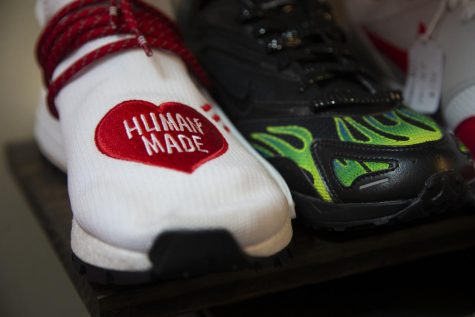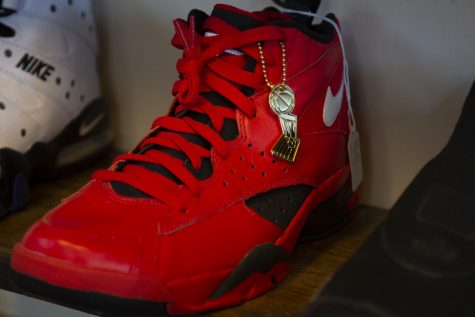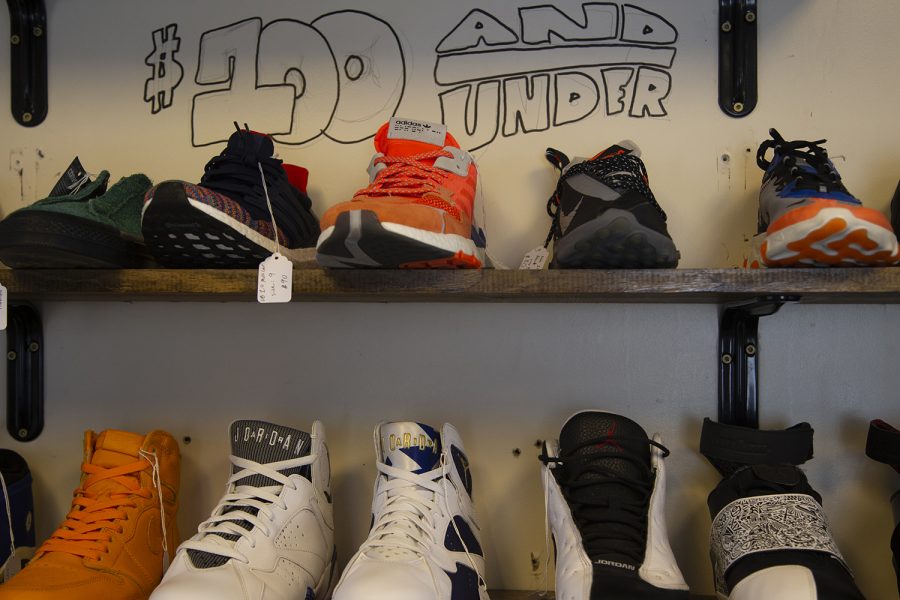The stories behind the shoelace: Sneakerhead culture and its economic rise in Iowa City
With the sneaker industry expected to grow even larger, some local entrepreneurs have developed their own business tactics in order to sell the perfect shoe.
Various sneakers are seen at Vice in Iowa City on Thursday, March 5, 2020.
March 12, 2020
Slipping on a pair of Air Force Ones Mid Tops, Elliott Martin’s white sneakers serve a deeper purpose for him than just protecting his feet — they’re a documentation of his travels.
The University of Iowa freshman has written down the names of several cities on his shoes, which now bear the names of Los Angeles, Detroit, New York City, and Seattle. Martin, who has collected shoes since high school, has found a way to turn his hobby into a trade.
“I’ve always had a business mindset,” he said. “I’m really cheap, so I realized I had a really, really good skill of finding well-priced shoes online, and so I used that to start my business.”
For his online business, called The Sneaker Shopp, Elliot regularly sells shoes to fellow sneakerheads, a community of individuals who avidly collect, trade, and admire sneakers. In the U.S., sneakers are classified as casual shoes with a soft, comfortable sole.
According to an article from Smithsonian Magazine, sneakers became widely popularized in the 1970s by both athletic and hip-hop icons, such as basketball player Chuck Taylor and rap group Run-DMC. However, the industry didn’t catch mainstream attention until 1985 when Nike released their legendary Air Jordan line in collaboration with basketball player Michael Jordan, inspiring a wave of collectors to begin trading their shoes.
Since some sneakerheads began creating businesses based off “flipping” shoes — a term that means reselling sneakers at a cheaper price — the sneaker resale market is expected to be worth around $6 billion by 2025, according to an article from Business Insider.

Shoe companies such as Nike have developed their own personalized stories behind sneakers, giving buyers more incentive to buy shoes outside of the design. One example includes its 2019 Air Jordan 1 Retro High OG SP Gina, a black sneaker with both a red sole and apple-shaped chain, created in celebration of Teacher’s Appreciation Week. The shoe was made for school teacher SP Gina, who has been a life-long customer for the company.
Although stories can already be attributed to sneakers by the brand, sneakerheads will also prescribe stories onto their shoes based on their own experiences. Martin’s Air Force Ones Mid Tops make him feel like he’s back in larger cities he’s previously visited.
“With clothes, you can’t really get that story as well, whereas with sneakers, they represent a person,” Martin said. “I just really think sneakers can tell a story much more than people think.”
While Martin continues to sell sneakers while in school, other entrepreneurs in Iowa City sell sneakers as their full-time job. Vice, which stands for Vintage Iowa City Exchange, is the only business in Iowa City that resells vintage sneakers.
RELATED: Iowa City’s Vice launches podcast about fashion, culture
Stepping inside Vice’s store, an assortment of clothing and knick-knacks dating to the 1980s and ’90s can be spotted all over, immediately transporting the customer back in time. They can also spot co-owners Tony Casella, Demetrius Perry, and Peter Krogull standing behind a glass counter that contains a wide array of bright colored sneakers.
Perry is originally from Atlanta, which he refers to as a city with a strong sneaker culture filled with people who would show off their shoes. His mother also worked in fashion and would dress him up in various types of shoes when he was younger.
“Just walking around the shoe store, shoes gave me a different feeling than toys,” Perry said. “I’ve been into shoes pretty much my whole life.”
A pair of shoes that carry a significant story for Perry were the Nike Air Yeezy 1, the first shoes he camped outside the store for 24 hours before their official release. The experience of waiting for the shoe also helped him adapt to “hunting” for sneakers.
Before Vice opened, all three owners found it difficult to gather sneakerheads in Iowa City together. In 2017, the three were involved in opening up a pop-up shop for sneakers in downtown Iowa City. The event attracted a large number of young customers who wanted to build their sneaker collection.
Krogull initially began trading sneakers back in 2008, mainly selling sneakers to customers who lived in both East and West Coast cities. After the pop-up shop closed, he realized sneakers were about to surge in Iowa City after it’s rise in coastal areas.
“After we did that, we just saw a big demand for it,” Krogull said. “People will say stuff that is trending now in the Midwest was trending two years ago on the Coasts… I felt like it would be only a matter of time before … it started to trickle in and other people in the Midwest would see it.”
Casella shared a similar sentiment about the growing demand of sneakers in the Midwest.
“There weren’t many options to buy shoes in the area, so our main drive was we needed to provide a place for them to get those sneakers,” Casella said.
The sneakers displayed in their store hold significant stories as well. The owners of Vice currently hold a rare Player Exclusive Jordan 1 shoe, as previously reported by The Daily Iowan.
“You don’t hear a lot about Iowa and rare sneakers, so it was kind of cool for everybody in the community,” Casella said.
Musicians have also created their own sneakers, such as Kanye West’s Yeezy brand or Travis Scott’s collaboration with Nike. Perry said the owners of Vice all closely follow celebrity collaborations with shoe brands, understanding the importance of taking notice of what’s trending from a business standpoint.
Perry said Vice tries to find the middle ground when it comes to appealing to both the average customer and sneakerheads with more niche interests.
“I think we do a good job of just riding the waves,” Perry said. “We do have a standard of what we like and what we think will sell, but we do keep our ears open.”
The amount of money customers are willing to spend on sneakers is also continually increasing. Another article from Business Insider reported that customers will spend up to $2,000 for a pair of classic Air Jordans.

“The average person isn’t afraid to drop $200 or $300 on a pair of shoes now,” Perry said. “Ten years ago, that was crazy talk.”
Krogull said social media plays a big part in the high demand and increasing prices for sneakers as well, with consumers rushing to show off their sneakers on platforms like Instagram.
“It’s not even about ‘I like this stuff,’ it’s more like a ‘I just got it, look what I have’ type of deal, so I think it’s almost turning into a status symbol,” he said.
Due to the high amount of money customers pour into sneakers, Casella said he doesn’t see the sneaker industry fading away anytime soon.
“[Sellers] know they can flip it, sell to us, and get credit,” Casella said. “There’s a lot more avenues to get your money back out of it than back in the day, so I think it’s only going to keep growing.”
Casella encouraged other students who sell sneakers to take risks when expanding their business, emphasizing how it’s important for a seller to diversify their line-up and not get caught up in selling popular, more common sneakers.
“We’ve dropped a bunch of money and didn’t know how it was going to turn out, but if you just sit on money and don’t invest in product and keep returning more product, you’re never going to grow,” Casella said. “People are after everything everywhere, so if you get any exclusive products or rare products, you’ll be fine.”
As prices and demand for sneakers continue to increase, Martin is willing to catch up with his competitors.
“There are going to be more people in the sneaker game and flipping shoes just like I am, so it’s going to bring more consumers, but it’s also going to bring more competition,” Martin said. “But I think that’s an overall plus, because sneakers are my passion, and any publicity for my passion is a good thing.”















